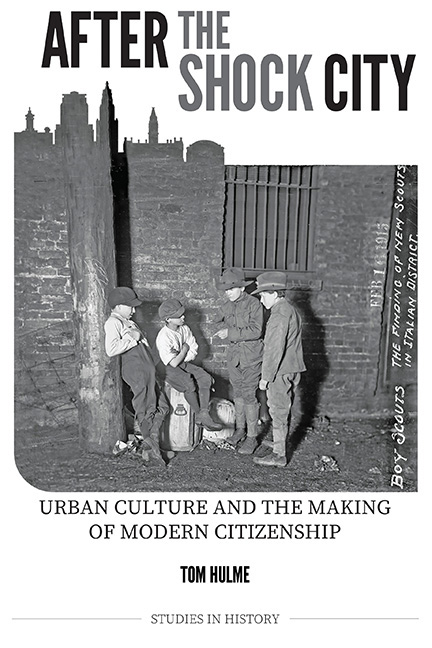Book contents
- Frontmatter
- Dedication
- Contents
- List of figures
- Acknowledgements
- Abbreviations
- Introduction: after the shock city
- 1 Citizenship and the Interwar City
- 2 Urban Utopias and Education
- 3 Celebrating the City
- 4 History, Progress and Community Performance
- 5 The Citizen of Tomorrow
- 6 Civic Culture and Welfare
- Conclusion: after the citizenship city
- Bibliography
- Index
3 - Celebrating the City
Published online by Cambridge University Press: 03 September 2019
- Frontmatter
- Dedication
- Contents
- List of figures
- Acknowledgements
- Abbreviations
- Introduction: after the shock city
- 1 Citizenship and the Interwar City
- 2 Urban Utopias and Education
- 3 Celebrating the City
- 4 History, Progress and Community Performance
- 5 The Citizen of Tomorrow
- 6 Civic Culture and Welfare
- Conclusion: after the citizenship city
- Bibliography
- Index
Summary
Civics classes were a formal classroom approach to creating urban citizenship. Teaching the city, however, could also be a much more spectacular affair. Festivals allowed whole places to become an advertisement for municipal government and big business, while also acting as an embellished backdrop for a ‘performance’ of urban community. Stories about the city, its history and its leaders were told in ways that encouraged loyalty and civic responsibility. Grand civic buildings, symbols of the cultural life provided by the city council, were emphasised through floodlighting and decoration. Mundane local infrastructure, such as power stations and gasworks, were opened to the public and promoted as the height of municipal modernity. The benefits of the modern city were made clear: a decent life provided by a professional local government. Celebrations of the city, though, also went beyond messages of municipal might. Parades, competitions and pageantry provided opportunities for the performance of a more inclusive civic identity. Public rituals that delineated governors and the governed were reinvented to suit the context of modern urban democracy. Not just the civic elite, but a broader urban public too, could make claims to importance in the city's future. Festival-organisers hoped that local people would absorb this message of commonality and faith in local government – and many seemingly did. But festival-goers could promote their own alternative visions of the purpose of the modern city and who it was for – visions that did not always tally with those propagated by official publicity. It was at these points that racial, class and gender inequality became most visible, calling into question the very notion of a cohesive urban community.
Most interwar civic festivals included an entertainment programme. Crowds were invited to watch and take part in sporting competitions, from swimming to boxing, or to simply enjoy public singing, dancing and music. There was more to this festive atmosphere than just enticing visitors, however. Firstly, strong footfall could equate to publicity and business for commercial operators, from the large-scale industrialist to the individual souvenir seller. Secondly, organisers realised that to bring city-dwellers into an arena where they would receive civic education, which even the most serious enthusiast would acknowledge could be a bit dry, required the pull of other attractions.
- Type
- Chapter
- Information
- After the Shock CityUrban Culture and the Making of Modern Citizenship, pp. 71 - 106Publisher: Boydell & BrewerPrint publication year: 2019



